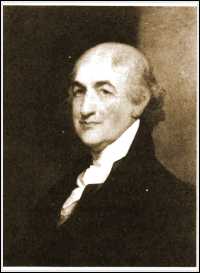Caleb Strong
Caleb Strong (born January 9, 1745 in Northampton , Province of Massachusetts Bay , † November 7, 1819 ibid) was an American politician and two-time governor of the state of Massachusetts .
Life
Career
Caleb Strong grew up as the son of Caleb Strong senior and his wife Phebe in Massachusetts and was homeschooled by private tutors. As a young man he studied at Harvard University , where he graduated in 1764. He then began studying law and was admitted to the bar in 1772. Following this, Strong began practicing law in his hometown of Northampton.
Political career
Strong held public offices early on when he became a member of the security committee in his hometown of Northampton in 1774. In 1776 he was elected to the Massachusetts House of Representatives for two years until 1778, and in the same year (1776) to the Hampshire County District Attorney . He held this office for no less than 24 years, until 1800. He turned down a promotion to the Supreme Court of the still young USA in 1783.
Under Strong's influence, the Massachusetts Constitution was ratified in 1780 . In the same year he was one of the first members of the American Academy of Arts and Sciences and he was elected as a delegate to the Continental Congress , which met in Philadelphia . Only a case of illness in his family and the absence of Strong was the reason why his signature on the United States Constitution could not be read. Nevertheless, as a member of the Federalist Party, he campaigned for its ratification.
In 1780 Strong was elected to the Massachusetts Senate, where he held a seat until 1788. Strong's reputation was one of the reasons why the citizens voted for him as one of the first two US senators for their home state of Massachusetts. Strong accepted the election and took office on March 4, 1789. He served until June 1, 1796.
In 1800 Strong ran as a federal candidate for the position of governor of Massachusetts - with success. He took office on May 30, 1800 and served for seven years, until May 29, 1807. A re-election in 1807 failed due to the emergence of the Democratic Republican Party and its candidate James Sullivan . Five years would pass before Strong succeeded in being re-elected governor in 1812. This time, his tenure was four years, from June 1812 to May 1816. Strong's most sustained influences as governor included the establishment of prisons in Massachusetts and the introduction of the death penalty . He was an opponent of the British-American War of 1812 and wanted military powers on the governor's agenda, not that of the US president .
Late life
After retiring from office as governor in 1816, he moved back to Northampton, where he again worked as a lawyer. He also devoted himself to his large family. He had nine children with his wife Sarah, but only four of them survived their father.
Caleb Strong died at the age of 74.
Dedications
Today the small town of Strong in Franklin County , Maine bears his name. The city of Strongsburg in the state of Ohio was briefly named after the US politician until it was renamed Windham in January 1829 . Today it is in Portage County .
During World War II , a US Navy Liberty freighter was christened SS Caleb Strong , also in honor of the Governor of Massachusetts.
Web links
- Caleb Strong in the Biographical Directory of the United States Congress (English)
- Caleb Strong in the National Governors Association (English)
- Caleb Strong in the database of Find a Grave (English)
| personal data | |
|---|---|
| SURNAME | Strong, Caleb |
| BRIEF DESCRIPTION | American politician |
| DATE OF BIRTH | January 9, 1745 |
| PLACE OF BIRTH | Northampton , Massachusetts |
| DATE OF DEATH | November 7, 1819 |
| Place of death | Northampton , Massachusetts |



